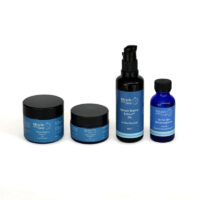How to Manage Rosacea
Rosacea is one of the most misdiagnosed conditions in all of Dermatology. “Rosacea” is generally defined by “pink cheeks.” This primarily descriptive and genetic condition can progress into inflammatory and pathological “Rosacea” - one of the most troublesome and chronic skin conditions in dermatology with a wide range of presentations.
How Are Inflammatory Rosacea and Non-inflammatory Rosacea Different?
Rosacea is commonly divided into two categories:
- Non-inflammatory Rosacea starts with flushing and blushing and can turn into persistent erythema (pinkness) and telangiectasia (visible small blood vessels).
- Inflammatory is the most aggressive and usually starts from a non-inflammatory Rosacea presentation.
Many doctors believe that non-inflammatory rosacea is exacerbated by thinning of the skin that allows the underlying blood vessels to show - especially on cheeks.
Why Does Rosacea Flare Up When It's Hot?
We've all seen that when a person becomes too hot, the face reddens. This is because the blood vessels dilate or swell to allow the warm blood to flow to the surface of the skin allowing heat to escape.
The blushing and flushing that is so characteristic of rosacea is directly affected by temperature increases such as hot weather, hot showers, exercise, spicy foods, alcohol, and hot fluids.
The heat causes vasodilation (the dilation of the blood vessels) creating redness in the face and rosacea flare ups. Therefore, it is often recommended that rosacea sufferers avoid hot, spicy foods and extended periods in the sun.
Best Moisturizers for Rosacea
The ingredients in Natural Marine Extract (NME) have been shown to promote marked improvement of thin, weak skin.
As they do with all atrophic skin conditions, these ingredients help generate new, active fibrocytes and capillaries that create tremendous amounts of:
- Collagen for skin strength
- Elastin for skin elasticity
- Hyaluronic acid for skin thickness
After helping to regenerate the thin skin of rosacea, you can magnify the benefits by applying collagen stimulating compounds containing retinal 5%, vitamin C 15% and glycolic acid 5%
Challenges of Inflammatory Rosacea
The inflammatory form of rosacea is much more severe. It usually includes pimples, pustules, cysts and swelling which can lead to deformities, especially on the nose, chin and cheeks. Medical treatment is necessary, including surgery. While Natural Marine Extract (NME) offers minimal benefit for inflammatory rosacea, if acneiform scar tissue is produced, it can be very useful. If possible, begin NME treatment of non-inflammatory rosacea before it becomes inflammatory.


